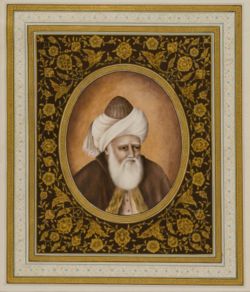Difference between revisions of "The music of Rumi"
| Line 22: | Line 22: | ||
''PART I'' | ''PART I'' | ||
| − | Blackout....Swirling nay emerges, followed by deep-toned bendir/tar (fades in); recitation of Rumi's Masnavi in Persian (2 lines) enters, followed by English, theme of the nay, the reed-bed...tar fades out... | + | * Blackout....Swirling nay emerges, followed by deep-toned bendir/tar (fades in); recitation of Rumi's Masnavi in Persian (2 lines) enters, followed by English, theme of the nay, the reed-bed...tar fades out... |
| − | Trio (Regula, Vinod, Michael) accompanies more recitation, theme of music...perhaps tar reenters at some point...then move to | + | * Trio (Regula, Vinod, Michael) accompanies more recitation, theme of music...perhaps tar reenters at some point...then move to |
| − | Geha's dance recitations, part I, with musical accompaniment, then | + | * Geha's dance recitations, part I, with musical accompaniment, then |
| − | Whirling dervishes projected onto screen (run throughout, but sound down) while next group sets up, with transition to | + | * Whirling dervishes projected onto screen (run throughout, but sound down) while next group sets up, with transition to |
| − | Indian ensemble performance, followed by | + | * Indian ensemble performance, followed by |
| − | Rumi poetry recitation (just 2 minutes) in Persian then English with nay and tar, theme of love, with transition to | + | * Rumi poetry recitation (just 2 minutes) in Persian then English with nay and tar, theme of love, with transition to |
| − | Arab ensemble (containing Persian ensemble subgroup where Rumi's poetry is actually performed) | + | * Arab ensemble (containing Persian ensemble subgroup where Rumi's poetry is actually performed) |
| Line 45: | Line 45: | ||
''PART II'' | ''PART II'' | ||
| − | Geha's dance recitations, part II (with musical accompaniment) opens second half, | + | * Geha's dance recitations, part II (with musical accompaniment) opens second half, |
Recitation (focus on ecstatic dance) with nay and tar, transition to | Recitation (focus on ecstatic dance) with nay and tar, transition to | ||
| − | Kreisha's performance | + | * Kreisha's performance |
| − | More Rumi recitation with nay and tar, themes of ecstasy of the ''dance'', then transition to | + | * More Rumi recitation with nay and tar, themes of ecstasy of the ''dance'', then transition to |
| − | African ensemble | + | * African ensemble |
| − | Final Rumi recitations - short poem --- concludes the program. | + | * Final Rumi recitations - short poem --- concludes the program. |
Revision as of 12:38, 6 November 2007

Rumi by Haydar Hatemi
Listen to the reed and the tale it tells,
How it sings of separation...
The music of Rumi is...
- music of his poetry (the sound of language itself, in the original Persian)
- music as metaphor in his poetry (music, instruments, musicians...)
- music of the performed Rumi text
- music as a metaphor for the performance of all mystical love texts
- music as metaphor for the ritual experience of Rumi's poetry, for Rumi as Mevlana, as saint
- music as metaphor for mystical experience and spirituality generally
- music as metaphor for the harmonious machinery of the cosmos, the synchrony of micro/macrocosm, the mutual whirling of human and universe...
Concert sketch:
PART I
- Blackout....Swirling nay emerges, followed by deep-toned bendir/tar (fades in); recitation of Rumi's Masnavi in Persian (2 lines) enters, followed by English, theme of the nay, the reed-bed...tar fades out...
- Trio (Regula, Vinod, Michael) accompanies more recitation, theme of music...perhaps tar reenters at some point...then move to
- Geha's dance recitations, part I, with musical accompaniment, then
- Whirling dervishes projected onto screen (run throughout, but sound down) while next group sets up, with transition to
- Indian ensemble performance, followed by
- Rumi poetry recitation (just 2 minutes) in Persian then English with nay and tar, theme of love, with transition to
- Arab ensemble (containing Persian ensemble subgroup where Rumi's poetry is actually performed)
---start intermission---
(let video of whirling dervishes run with sound up)
---end intermission---
PART II
- Geha's dance recitations, part II (with musical accompaniment) opens second half,
Recitation (focus on ecstatic dance) with nay and tar, transition to
- Kreisha's performance
- More Rumi recitation with nay and tar, themes of ecstasy of the dance, then transition to
- African ensemble
- Final Rumi recitations - short poem --- concludes the program.